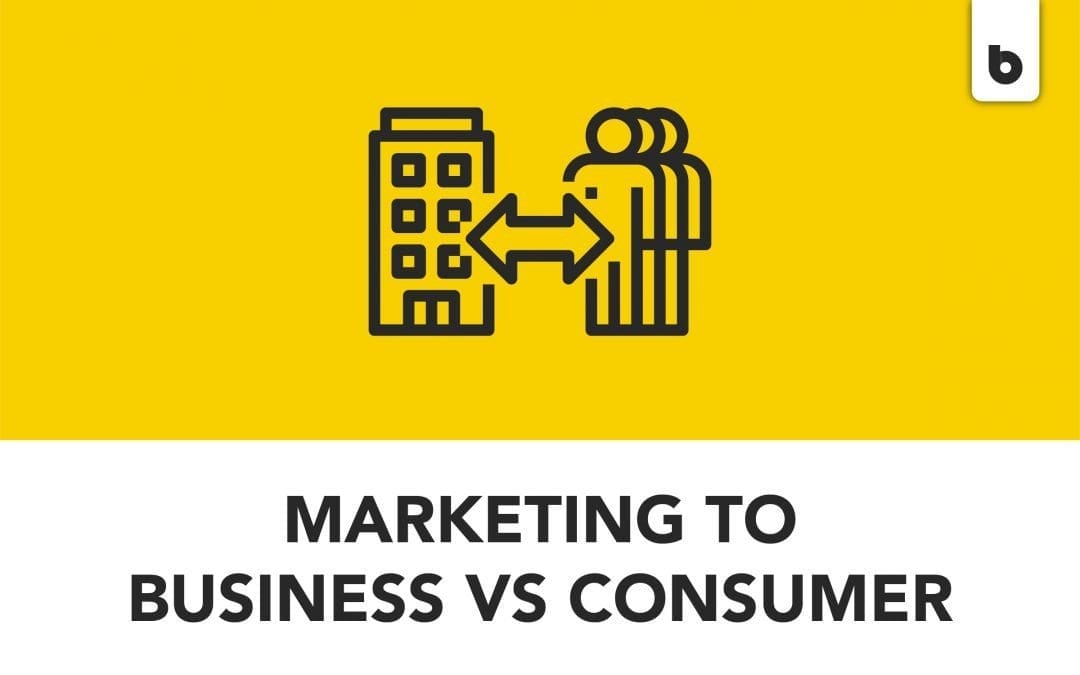As we’ve mentioned in the past, the world of marketing is chock-full of acronyms. Perhaps two of the most common are B2B and B2C, and because they’re so widely used, it’s important to know what they stand for and how they differ from one another. Let’s look at 3 differences between marketing to businesses and marketing to consumers.
What are B2B and B2C?
B2B stands for “business to business,” and B2C stands for “business to consumer.” If you’ve worked in business or marketing at all, you’re probably already pretty familiar with both acronyms. However, you may be less familiar with the marketing strategies that accompany each one. Because each one has a different target audience (businesses or consumers), the methods you choose in order to reach your audience will differ. There are so many different caveats to each type of marketing, and we could go on forever…but let’s just establish the basics.
1. Marketing to businesses often requires identifying your niche first.
A niche market is a market in which people share particular needs, interests, or other commonalities. These are more specific markets within broader ones; for example, if the broader market was pet owners, a niche market would be dog collars. More often than not, you’ll have a niche in mind when you first start your business. However, if you don’t, it’s a good idea to figure one out sooner rather than later. This can help you to target your content more specifically, which in turn gets you more results. It’s a win-win!

When you’re marketing to consumers, you are dealing with a broader market. You can still target your content, of course, but it’s a little bit of a wider lens. This isn’t a bad thing – that means there’s more people out there looking for businesses like yours! It does mean you might have to work a little bit harder to stand out from your competition, though. (Blackwood can help you with that. *wink wink*)

2. Relationships you form with clients will look a little different between the two.
Sales are a large focus of marketing to consumers. As such, a lot of the relationships you’ll want to try and form are going to be transactional. When you’re driving sales, tactics like email marketing and remarketing can be revolutionary. Even when you’re trying to get people to purchase something from you, it’s important to maintain some level of personality and customer service. Be accessible!
On the other hand, business is all about networking, so it would make sense that when you’re marketing to businesses, networking plays an equally big role. It’s true – when you’re marketing to businesses, you’ll want to focus on making good personal connections with other people either in your industry or that you hire/are hired by. Those connections are immensely beneficial, especially in cases where your businesses can partner up!
3. Your branding will largely depend on your industry and audience.
Regardless of whether you’re marketing to businesses or consumers, it is extremely important to have consistent branding across all of your platforms – both online and “in real life.” The difference lies in the purpose behind your branding.
For B2B branding, as we discussed a moment ago, you want to focus more on relationships between your business and your client. B2C branding is largely meant to be another tactic used to drive sales, although it can serve other purposes as well. Your branding says a lot about your business; you want to make sure it aligns with what you’re trying to do!

Whether you’re marketing to businesses or consumers, keep in mind the 2 cardinal rules of marketing (in our humble opinion): consistency and quality. And, of course, if you need help, you’re in the right place. Our team of experts here at Blackwood Creative would be more than happy to work with you and help you meet and exceed your business goals. We’re in the business of building remarkable brands – yours could be next. Reach out to us today!

